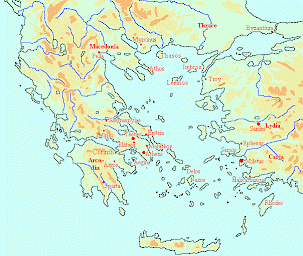Herodotus, bk 5, logos 14
Herodotus of Halicarnassus (c.480-c.429 BCE): Greek researcher, often called the world's first historian. In The Histories, he describes the expansion of the Achaemenid Empire under its kings Cyrus the Great, Cambyses, and Darius I the Great, culminating in Xerxes' expedition to Greece (480 BCE), which met with disaster in the naval engagement at Salamis and the battles at Plataea and Mycale. Herodotus' book also contains ethnographic descriptions of the peoples that the Persians have conquered, fairy tales, gossip, and legends.

Beginning of the Ionian Revolt; affairs in Greece (5.28-55)
In the next logos Herodotus explains how the Ionian Greeks living in the Achaemenid Empire revolt against Darius. He considers this a disaster, caused by the short-sighted and egoistical behavior of several Greek protégés of the great king. While Histiaeus stays at the Persian court (above), his home town Miletus (Ionia's main city) is ruled by his son-in-law Aristagoras, who tries to add the Greek islands in the Aegean Sea to the Achaememid empire and his own sphere of influence. He and the Persian governor of Lydia, Artaphernes, join forces, but they fail to capture the most important island, Naxos.
Aristagoras does not wait until he has fallen in disfavor with Darius, and decides to revolt against the great king. However, Herodotus knows another story: Histiaeus, irked by his honorable detention, had sent a trusted slave to Ionia, with the word 'revolt' tattooed on his scalp. Whatever the true reason, the Ionian Greeks rebel. The pro-Persian leaders are seized, democratic government is established, and preparations are made for the war. The Milesian Hecataeus of Miletus (the man responsible for the description of the hippopotamus; above) proposes to rely on the navy and to pay the marines from the temple treasury of the Branchidae, anoracle that had received extraordinary gifts from king Croesus. This advise is ignored; instead, Aristagoras decides to ask for help from Sparta, famous for its army.
Herodotus starts his description of Aristagoras' visit to Sparta with a story about his host, king Cleomenes. We hear strange rumors about his birth, learn that he was 'not quite right in his head' and understand that his behavior caused great trouble in his country. His half-brother Dorieus, who was unable to accept the fact that a madman was ruling Sparta, had even gone off to Sicily. This Cleomenes receives the Milesian envoy, who delivers a very long speech about the glories of a war against Persia. (Herodotus digresses on the size of the Achaemenid Empire, describing the Royal road from Sardes to Susa.) The king's laconic answer to Aristagoras' speech is that 'the proposal to take the Spartans a three months' journey from the sea is a highly improper one', and Aristagoras is requested to leave.
Comment
Naxos was the main island of the Cyclades archipelago. These islands - several of which were rich in natural resources - were a kind of bridge to the Greek mainland and a logical aim for Persian expansion. Aristagoras may have been hoping for the ownership of the silver mines of Siphnos or the marble quarries of Paros. The incident cannot be dated precisely, but belongs to the closing years of the sixth century BCE.
The chronology of the events leading to the Ionian revolt is controversial, but 499 is a good guess; Aristagoras' embassy to the Greek mainland may have taken place in the winter of 499-498.
Herodotus' picture of Histiaeus may be a shade too dark. In fact, the complete story about Histiaeus' behavior in this logos and the following logoi is a bit strange. If it was removed from The Histories, the remainder would be easier to understand; it looks as if Herodotus had already written a consistent account of the Ionian revolt, when he decided to add the stories about Histiaeus.
It is very interesting to note that Herodotus writes at the beginning of Book Six (as we will see below), that Histiaeus claimed to have acted to prevent Darius from deporting the Ionians. Herodotus says that this was a lie, but the story sounds very plausible. In the ancient world, deportation was a common policy, as the inhabitants of the Cyrenaica had already found out (above) and those of Eretria were to discover (below).
An interesting aspect of the fourteenth logos is Herodotus' story about the establishment of democratic government. As we will see in the next logos, the first experiment with this system had started only a few years before in Athens.
From a strategic point of view, Hecataeus' advise to rely on the navy was better than Aristagoras' idea to ask help from an army: the Ionian cities had no depth of territory within which armies could maneuver, whereas a strong navy could have kept the Phoenician ships (the backbone of the Persian fleet) out of the Aegean Sea.
Sparta was famous for its well trained soldiers. One of the peculiar characteristics of the constitution of this military state was the fact that it had two kings. King Cleomenes ruled from about 520 until 491; as we will see below, he managed to usurp the powers of a sole ruler, virtually eclipsing the other king, Demaratus. After Cleomenes' death, Dorieus' younger brother Leonidas (below) succeeded him and the other dynasty regained its influence under Demaratus' relative Leotychides.
When Herodotus says that Cleomenes suffered from a mental disease, he probably repeats hostile traditions that circulated in the families of Leotychides and Leonidas. Cleomenes' answer to Aristagoras ('the proposal to take the Spartans a three months' journey from the sea is a highly improper one') betrays a very healthy judgment.
The Royal road from Sardes to Susa is also known from Persian sources. At Persepolis, several tablets were found which refer to the system of horse changing; it was called pirradaziš.